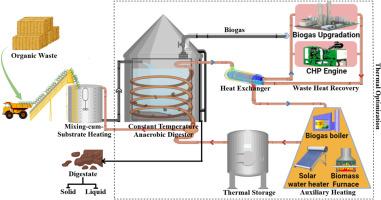Comprehensive thermal assessment of anaerobic digestion process in biogas plants
IF 16.3
1区 工程技术
Q1 ENERGY & FUELS
引用次数: 0
Abstract
As the world transitions toward renewable energy solutions, anaerobic digestion (AD) is emerging as a key technology for biogas production. Among the key parameters influencing biogas production, temperature plays a critical role. Without adequate thermal regulation, biogas production may drop by over 50 %, impacting plant feasibility. This review comprehensively analyses thermal management in AD, emphasizing the critical role of temperature regulation and the factors affecting thermal demand. A structured three-tiered approach that incorporates heat retention, recovery, and external supply is presented to optimize thermal efficiency and reduce operational costs. Passive techniques utilizing insulation and phase change materials can reduce heat loss by up to 82 % and lag internal temperature fluctuations. Waste heat recovery from effluent, equipment, and/or integrated industry can meet up to 100 % of thermal energy requirements. Although solar thermal systems are observed to offer low-emission and operating-cost heating, their high capital and land requirements may limit feasibility. Hybrid systems combining solar, biogas, and biomass can provide scalable, climate-resilient alternatives with lower emissions and improved reliability. The review also dwells into Techno-economic evaluations showing that, despite capital and operating costs, well-designed systems achieve net-positive energy outcomes and short payback periods. Chronological advancements in computational fluid dynamics and modelling demonstrate prediction accuracy exceeding 85 %, significantly reducing design uncertainties and implementation costs. This review concludes with challenges and recommendations for modular, strategic, site-specific hybrid heating strategies, future policy, and research suggestions. By integrating technical insights, it offers a comprehensive framework to enhance AD performance, energy efficiency, and environmental sustainability.

沼气厂厌氧消化过程的热综合评价
随着世界向可再生能源解决方案的转变,厌氧消化(AD)正在成为沼气生产的关键技术。在影响沼气生产的关键参数中,温度起着至关重要的作用。如果没有适当的热调节,沼气产量可能下降50%以上,影响工厂的可行性。本文全面分析了AD的热管理,强调了温度调节的关键作用和热需求的影响因素。采用结构化的三层方法,结合蓄热、回收和外部供应,以优化热效率并降低运营成本。利用绝缘和相变材料的被动技术可以减少高达82%的热损失,并延迟内部温度波动。从废水、设备和/或综合工业中回收的废热可以满足高达100%的热能需求。尽管人们观察到太阳能热系统提供低排放和运行成本的加热,但其高资本和土地要求可能限制其可行性。结合太阳能、沼气和生物质的混合系统可以提供可扩展的、适应气候变化的替代方案,同时降低排放,提高可靠性。该综述还深入探讨了技术经济评估,表明尽管存在资本和运营成本,设计良好的系统仍能实现净正能源成果和较短的投资回收期。计算流体动力学和建模的时间顺序进步表明预测精度超过85%,大大减少了设计的不确定性和实施成本。本文总结了模块化、战略性、特定地点混合供暖策略的挑战和建议,以及未来的政策和研究建议。通过整合技术见解,它提供了一个全面的框架,以提高AD性能,能源效率和环境可持续性。
本文章由计算机程序翻译,如有差异,请以英文原文为准。
求助全文
约1分钟内获得全文
求助全文
来源期刊

Renewable and Sustainable Energy Reviews
工程技术-能源与燃料
CiteScore
31.20
自引率
5.70%
发文量
1055
审稿时长
62 days
期刊介绍:
The mission of Renewable and Sustainable Energy Reviews is to disseminate the most compelling and pertinent critical insights in renewable and sustainable energy, fostering collaboration among the research community, private sector, and policy and decision makers. The journal aims to exchange challenges, solutions, innovative concepts, and technologies, contributing to sustainable development, the transition to a low-carbon future, and the attainment of emissions targets outlined by the United Nations Framework Convention on Climate Change.
Renewable and Sustainable Energy Reviews publishes a diverse range of content, including review papers, original research, case studies, and analyses of new technologies, all featuring a substantial review component such as critique, comparison, or analysis. Introducing a distinctive paper type, Expert Insights, the journal presents commissioned mini-reviews authored by field leaders, addressing topics of significant interest. Case studies undergo consideration only if they showcase the work's applicability to other regions or contribute valuable insights to the broader field of renewable and sustainable energy. Notably, a bibliographic or literature review lacking critical analysis is deemed unsuitable for publication.
 求助内容:
求助内容: 应助结果提醒方式:
应助结果提醒方式:


